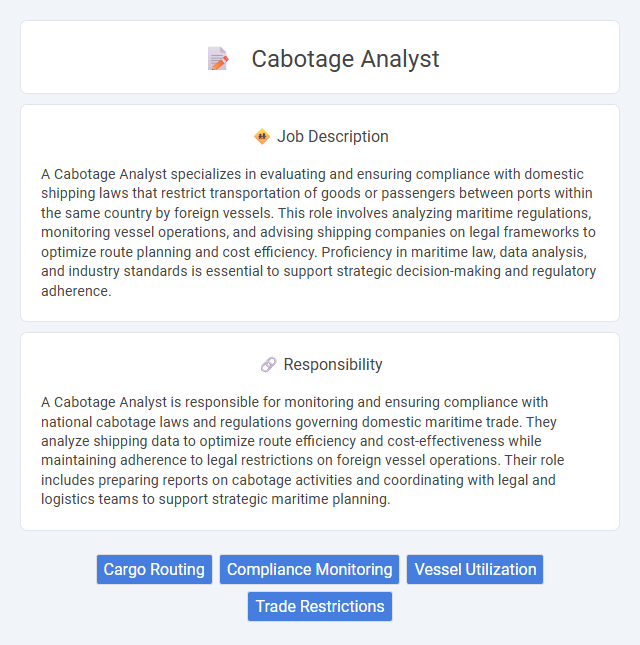
A Cabotage Analyst specializes in evaluating and ensuring compliance with domestic shipping laws that restrict transportation of goods or passengers between ports within the same country by foreign vessels. This role involves analyzing maritime regulations, monitoring vessel operations, and advising shipping companies on legal frameworks to optimize route planning and cost efficiency. Proficiency in maritime law, data analysis, and industry standards is essential to support strategic decision-making and regulatory adherence.
Individuals with strong analytical skills and a keen eye for maritime regulations are likely to excel as Cabotage analysts. Candidates who are detail-oriented, possess excellent problem-solving abilities, and can work effectively under pressure might find this role particularly suitable. Those who prefer dynamic environments and have an interest in shipping laws may have a higher probability of success in this position.
Qualification
A Cabotage analyst requires a strong background in maritime law, international trade regulations, and shipping logistics to ensure compliance with national cabotage policies. Proficiency in data analysis, risk assessment, and regulatory frameworks is essential for evaluating domestic shipping rights and optimizing route strategies. Advanced skills in communication and policy interpretation support effective collaboration with stakeholders and regulatory authorities.
Responsibility
A Cabotage Analyst is responsible for monitoring and ensuring compliance with national cabotage laws and regulations governing domestic maritime trade. They analyze shipping data to optimize route efficiency and cost-effectiveness while maintaining adherence to legal restrictions on foreign vessel operations. Their role includes preparing reports on cabotage activities and coordinating with legal and logistics teams to support strategic maritime planning.
Benefit
A Cabotage analyst likely offers significant benefits by enhancing compliance with maritime regulations and optimizing domestic shipping routes. They probably improve cost efficiency for companies by identifying legal and operational advantages within cabotage laws. Their expertise may reduce risks associated with cross-border shipping, increasing overall logistical reliability.
Challenge
The Cabotage analyst job likely presents the challenge of navigating complex regulatory frameworks that differ across regions and impact domestic shipping policies. Analyzing trade data and compliance requirements may require strong attention to detail and the ability to interpret evolving maritime laws. It is probable that adapting to frequent legislative changes and coordinating with multiple stakeholders will be a critical aspect of the role.
Career Advancement
Cabotage analysts play a crucial role in monitoring and interpreting maritime laws regulating domestic shipping routes, offering strategic insights to optimize vessel operations. Expertise in cabotage regulations enhances career progression opportunities within maritime compliance, logistics firms, and government agencies overseeing coastal trade. Advanced skills in data analysis and regulatory frameworks can lead to senior positions such as compliance manager or maritime policy advisor.
Key Terms
Cargo Routing
A Cabotage Analyst specializing in cargo routing optimizes domestic shipping routes to comply with maritime cabotage laws, ensuring efficient and cost-effective transportation within a country's borders. They analyze trade data, vessel capacities, and port regulations to recommend optimal routing solutions that minimize transit time and expenses. Expertise in national shipping policies and logistics management is essential for maximizing operational efficiency and regulatory adherence.
Compliance Monitoring
Cabotage analysts specializing in compliance monitoring ensure maritime and shipping operations adhere to national cabotage laws, preventing violations that could lead to legal penalties or operational delays. They analyze shipping routes, cargo documentation, and vessel registration to verify conformity with domestic trade regulations, safeguarding the interests of local industries. Their role is critical in maintaining regulatory compliance and optimizing the enforcement of cabotage policies across maritime logistics chains.
Vessel Utilization
A Cabotage analyst specializing in vessel utilization evaluates coastal shipping routes to maximize efficiency and compliance with local maritime laws. They analyze shipping data, cargo loads, and scheduling to optimize vessel capacity while reducing operational costs and minimizing transit times. Expertise in regional trade regulations and port capabilities ensures strategic deployment of vessels within cabotage zones.
Trade Restrictions
A Cabotage Analyst specializes in evaluating trade restrictions related to the transportation of goods and passengers within a country's domestic maritime or aviation sectors. This role involves analyzing regulatory frameworks that limit foreign ownership, vessel registration, and route access to protect national industries and ensure compliance with international trade laws. Expertise in cabotage laws enhances supply chain efficiency by identifying risks and opportunities within the constraints of territorial trade protections.
 kuljobs.com
kuljobs.com